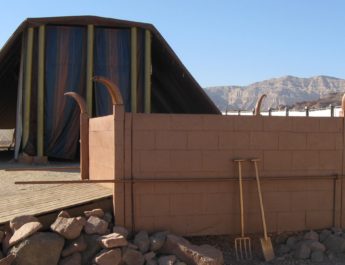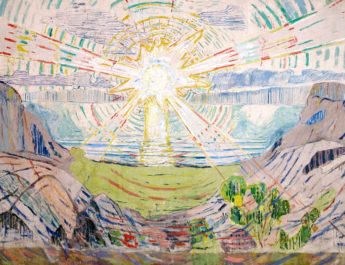2 Kings 11:1-4, 10-12
Easter Vigil – A Women’s Lectionary
1 Now when Athaliah,A Ahaziah’sB mother,C
A “Athaliah” = Athalyah. 17x in OT. Perhaps from the same as Athlay (Ahtlai, a name that may mean “constringent”) + Yah (the shortened form of the name of the God of Israel; God, Lord); {from YHVH (proper name of the God of Israel; God, Lord; the self-existent or eternal one); from havah (to become) or hayah (to be, become, happen)} OR from atal (to be exalted, treat violently) + Yah (see above). This is Athaliah or Athlai. It is a name meaning “the Lord has constrained” or “the Lord is Exalted” or “taken away by the Lord.” See https://www.abarim-publications.com/Meaning/Athaliah.html
B “Ahaziah’s” = Achazyah. Related to “Athaliah” in v1. From achaz (to grasp, catch, seize, take and hold in possession) + Yah (see note A above). This is Ahaziah – a name meaning “the Lord has grasped” or “the Lord has seized” or “upheld of the Lord.” See https://www.abarim-publications.com/Meaning/Ahaziah.html
C “mother” = em. This is a mother as binding a family together or a breeding female animal. It could be mother in a literal or figurative sense.
sawD that her sonE was dead,F she set aboutG
D “saw” = raah. This is to see in a literal or figurative sense so stare, advise, think, view.
E “son” = ben. From banah (to build or obtain children). This is son, age, child. It is son in a literal or figurative sense.
F “was dead” = mut. This is to die in a literal or figurative sense. It can also refer to being a dead body.
G “set about” = qum. To arise, stand, accomplish, establish, abide. This is rising as in rising against, getting up after being sick or asleep, arising from one state to another, becoming powerful, or rising for action. It can also be standing in a figurative sense.
to destroyH allI the royalJ family.K
H “destroy” = abad. To wander off, lose self. This implies to perish, destroy, die, vanish, or be broken or corrupt.
I “all” = kol. From kalal (to complete). This is all or every.
J “royal” = mamlakah. From the same as melek (king, royal); from malak (to be or become king or queen, to rise to the throne, to be crowned; by implication, to take counsel). This is kingdom, dominion, sovereignty, rule. It can also refer to the realm.
K “family” = zera. From zara (to sow or scatter seed; conceive or yield). This is seed or sowing. It can, thus, mean a fruit, plant, sowing time, child, offspring, or posterity.
2 But Jehosheba,L KingM Joram’sN daughter,O
L “Jehosheba” = Yehosheba. Related to “Athaliah” and “Ahaziah’s” in v1. 1x in OT. From YHVH (see note A above) + shaba (to swear, curse, vow, make a covenant; properly, to be complete; this is to seven oneself – as in affirming something so strongly it is as though it were said seven times) {perhaps from sheba (seven – the number of perfection/sacred fullness)} This is Jehosheba – a name meaning “the Lord is an oath” or “the Lord swore” or “the Lord’s oath.” See https://www.abarim-publications.com/Meaning/Jehosheba.html
M “King” = melek. Related to “royal” in v1. See note J above.
N “Joram’s” = Yoram. Related to “Athaliah” and “Ahaziah’s” in v1 & “Jehosheba” in v2. From the same as Yehoram (Jehoram – a name meaning “the Lord is exalted); {from YHVH (see note A above) + rum (rise, bring up, being high, extol, exalt, haughty; to raise in a literal or figurative sense)}. This is Joram or Jehoram – a name meaning “the Lord-raised” or “the Lord is exalted” or “the Lord exalts.” See https://www.abarim-publications.com/Meaning/Joram.html
O “daughter” = bat. Related to “son” in v1. From ben (see note E above). This is daughter in a literal or figurative sense.
Ahaziah’s sister,P tookQ JoashR son of Ahaziah,
P “sister” = achot. From the same as ach (brother, kindred, another, other, like). This is sister in a literal or figurative sense. It can also mean another or together.
Q “took” = laqach. This is to take, accept, carry away, receive. It can also have the sense of take a wife or take in marriage.
R “Joash” = Yoash. Related to “Athaliah” and “Ahaziah’s” in v1 & “Jehosheba” in and “Joram’s” in v2. From the same as Yehoash (Jehoash, meaning “the Lord is strong); {from YHVH (see note A above) + perhaps esh (fire, burning, flaming, hot; fire in a literal or figurative sense)}. This is Joash – a name that may mean “the Lord is strong.”
and stole him awayS from amongT the king’s childrenU who were about to be killed;V
S “stole…away” = ganab. This is to steal in a stealthy way rather than through violence. It can also mean to deceive. There is a Yiddish word ganef that derives from this root. It means thief or scoundrel.
T “from among” = tavek. This is among, middle, in the midst, the center. Perhaps, properly, to sever.
U “children” = ben. Same as “son” in v1. See note E above.
V “be killed” = mut. Same as “was dead” in v1. See note F above.
she put him and his nurseW in a bedroom.X Thus she hidY him fromZ Athaliah, so that he was not killed;
W “nurse” = yanaq. This is to suckle or to nurse. In a causative sense, it can mean to give milk. So, this word can be used for a nursing mother or for her suckling child.
X “bedroom” = cheder + mittah. Cheder is from chadar (to surround or enclose; a room as enclosed; also, by analogy, besieging). This is a chamber or room that is private. Can mean the innermost chamber of a house. Mittah is from natah (to stretch or spread out, extend, bend). This is a couch or bed that is spread out to sleep on or for eating. It can also refer to a litter or a bier.
Y “hid” = sathar. This is hide, conceal, or be absent. It is hiding because something is covered – used in a literal or figurative sense.
Z “from” = paneh. From panah (to turn, face, appear). This is face in a literal or figurative sense. It could be face, presence, anger, respect. It can also be used of God to indicate divine favor or presence.
3 he remainedAA with her sixBB years,CC hiddenDD in the houseEE of the Lord,FF while Athaliah reignedGG over the land.HH
AA “remained” = hayah. Related to “Athaliah” and “Ahaziah’s” in v1 & “Jehosheba” in and “Joram’s” and “Joash” in v2. See note A above.
BB “six” = shesh. This is six. Figuratively, it can be a surplus since it is one more than the number of fingers on the hand.
CC “years” = shanah. From shana (to change, alter). This is a year, age, old. It can also mean yearly.
DD “hidden” = chaba. This is to hide, hush, harden (like water freezing), or secret.
EE “house” = bayit. Related to “son” in v1 & “daughter” in v2. Probably from banah (see note E above). This is house, court, family, palace, temple.
FF “Lord” = YHVH. Related to “Athaliah” and “Ahaziah’s” in v1 & “Jehosheba” in and “Joram’s” and “Joash” in v2 & “remained” in v3. See note A above.
GG “reigned” = malak. Related to “royal” in v1 & “king” in v2. See note J above.
HH “land” = erets. Root may mean to be firm. This is earth, ground, field land, or country.
4 But in the seventhII year JehoiadaJJ summonedKK
II “seventh” = shebii. Related to “Jehosheba” in v2. From sheba (see note L above). This is seventh.
JJ “Jehoiada” = Yehoyada. Related to “Athaliah” and “Ahaziah’s” in v1 & “Jehosheba” in and “Joram’s” and “Joash” in v2 & “remained” and “Lord” in v3. From YHVH (see note A above) + yada (to know, be aware, see and so understand – includes observation, care, recognition; can also be used as a euphemism). This is Jehoiada – a name meaning “the Lord knows” or “Lord-known.”
KK “summoned” = shalach + laqach. Shalach is to send out, away, send for, forsake. It can also mean to divorce or set a slave free. Laqach is the same as “took” in v2. See note Q above.
the captainsLL of the CaritesMM and of the guardsNN and had them comeOO to him in the house of the Lord.
LL “captains” = sar + meah. Sar is chief, leader, ruler, lord, official, governor, prince, military leader. It refers to someone at the top of a rank or class. Meah is hundred or some number times one hundred (i.e. hundredfold or the base of two hundred, three hundred, etc.).
MM “Carites” = kari. 4x in OT. From karah (to make a banquet, prepare) OR perhaps from kar (a ram, battering ram, lamb, pasture for sheep, camel’s saddle, furniture); {from karar (to dance, whirl)}. This is Kari, Carites, or captains. It is one who leads a flock. It may also mean “professional soldier.” See https://www.abarim-publications.com/Meaning/Carites.html
NN “guards” = ruts. This is to run or rush, divide quickly, bring swiftly. It can also refer to a footman or guard.
OO “come” = bo. This is to enter, come in, advance, fulfill, bring offerings, enter to worship, attack. It can also have a sexual connotation.
He madePP a covenantQQ with them and put them under oathRR in the house of the Lord; then he showedSS them the king’s son.
PP “made” = karat. This is to cut down, cut off, or make a covenant (idiom for making a covenant is “to cut a covenant”). It can also mean to destroy, fail, or consume.
QQ “covenant” = berit. Perhaps from barah (to eat, choose, make clear); perhaps from bar (grain, wheat); from bara (to select, purify, cleanse, test, brighten, polish). This is a compact, covenant, alliance, treaty, or league.
RR “put…under oath” = shaba. Related to “Jehosheba” in v2 & “seventh” in v4. See note L above.
SS “showed” = raah. Same as “saw” in v1. See note D above.
10 The priestTT deliveredUU to the captains the spearsVV and shieldsWW that had been King David’s,XX which were in the house of the Lord;
TT “priest” = kohen. This is literally the one who officiates i.e. the priest. This is where the Jewish last name “Cohen” (and its variants) comes from.
UU “delivered” = natan. This is to give, put, set, offer. It is to give literally or figuratively.
VV “spears” = chanith. From chanah (to decline, bending down, or living in tents; can be camping to create a home or camping as a part of battle). This is a spear or lance as a weapon that is thrust in the same way one pitches a tent.
WW “shields” = shelet. 7x in OT. Perhaps from shalat (to rule, dominate, govern; it can also mean to bear or permit). This is a shield or quiver.
XX “David’s” = David. From the same as dod (beloved, love, uncle); the root may mean to boil, which is used figuratively to describe love. So, this implies someone you love such as a friend, a lover, or a close family member like an uncle. David’s name likely means something like “beloved one.”
11 the guards stood,YY every manZZ with his weaponsAAA in his hand,BBB, CCC
YY “stood” = amad. This is to stand up in a literal or figurative sense. So it can be establish, continue, endure, take a stand, act, be a servant, stand still, remain, stand against an enemy.
ZZ “every man” = ish. Perhaps from enosh (human, humankind, mortal); from anash (to be weak, sick, or frail). This is man, husband, another, or humankind.
AAA “weapons” = keli. From kalah (to end, be finished, complete, prepare, consume, spent, or completely destroyed). This is something that was prepared – any implement, utensil, article, vessel, weapon, or instrument. Also includes jewels, weapons, bags, carriages, and furniture.
BBB “hand” = yad. This is hand, ability, power. Hand in a literal sense, but also what one can do or the means by which one does it.
CCC {untranslated} = katheph. Root may mean to clothe. This is shoulder, side, corner.
from the south sideDDD of the house to the north sideEEE of the house, aroundFFF the altarGGG and the house, to guard the king on every side.HHH
DDD “south side” = yemani. From the same as yamin (right hand or side; that which is stronger or more agile; the south); {perhaps yamam (to go or choose the right, use the right hand; to be physically fit or firm)}. This is right, right side, or south.
EEE “north side” = katheph. Same as {untranslated} in v11. See note CCC above.
FFF “around” = semali. 9x in OT. From the same as semol (left, left side, or north as the part that is dark); perhaps from the same as simlah (mantle, clothes, wrapper); from semel (image, figure, likeness). This is left, left side, or around.
GGG “altar” = mizbeach. From zabach (to kill, slay, offer; slaughtering an animal to offer as a sacrifice). This is an altar.
HHH “every side” = sabib. From sabab (turning around, going around; to surround, cast, walk, fetch; to revolve or border in a literal or figurative sense). This is a circuit or a circle. It could refer to an environment, one’s neighbors, or a circular path round about.
12 Then he brought outIII the king’s son, putJJJ the crownKKK on him, and gave him the covenant;LLL
III “brought out” = yatsa. This is to go or come out, bring forth, appear. It is to go out in a literal or figurative sense.
JJJ “put” = natan. Same as “delivered” in v10. See note UU above.
KKK “crown” = nezer. From nazar (to dedicate, set apart, fast, keep self from impurity, refrain from worship; to consecrate for a holy purpose). This is something set apart, so it is a consecration. It could be used for one who takes the Nazirite vow or a priest. In reference to the Nazirite vow, it can also refer to uncut hair. It can also refer to a crown, as of a king.
LLL “covenant” = eduth. From ed (witness, testimony, recorder); from ud (to admonish, repeat, duplicate, testify, restore, record, relieve). This is testimony, ordinance, decree, warning, or witness.
they proclaimed him king,MMM and anointedNNN him; they clappedOOO their handsPPP and shouted,QQQ “Long liveRRR the king!”
MMM “proclaimed…king” = malak. Same as “reigned” in v3. See note GG above.
NNN “anointed” = mashach. This is smear, paint, spread, or paint. It can also be to rub with oil or, otherwise stated, to anoint. This implies a consecration. This root verb is where the word “messiah” comes from.
OOO “clapped” = nakah. This is to hit whether lightly or severely. It can be used in a literal or figurative sense. So, this could be beat, punish, give wounds, kill, or slaughter.
PPP “hands” = kaph. From kaphaph (to bend – from a root meaning curve or bend down). This is palm of the hand or sole of the foot, footstep, grasp. Figuratively, it can also mean power.
QQQ “shouted” = amar. This is to speak, say, answer, command, promise, report.
RRR “long live” = chayah. This is to live or keep alive in a literal or figurative sense. So, it an be revive, nourish, or save.
Image credit: “Infant Outline” by graham, 2009.




